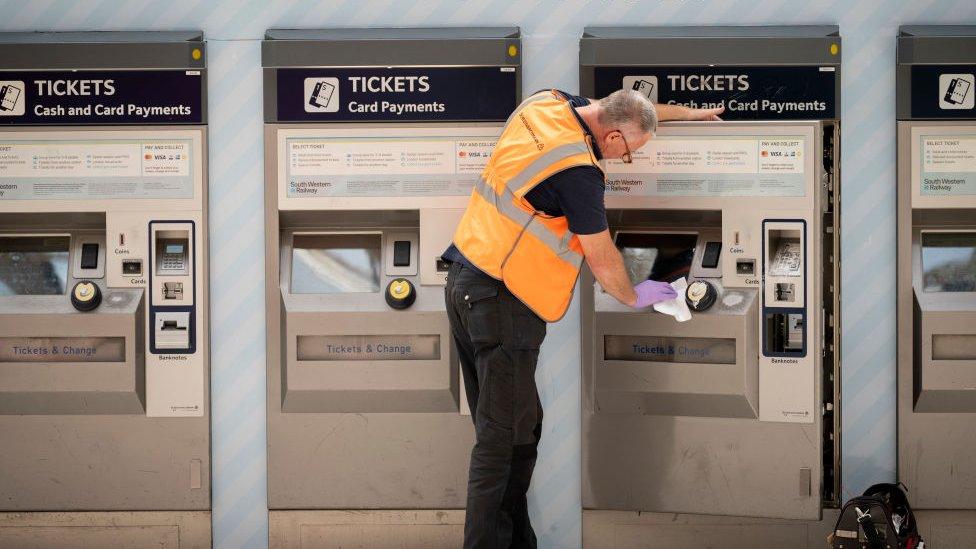Rail strike: New Wales disruption on second day of action
- Published
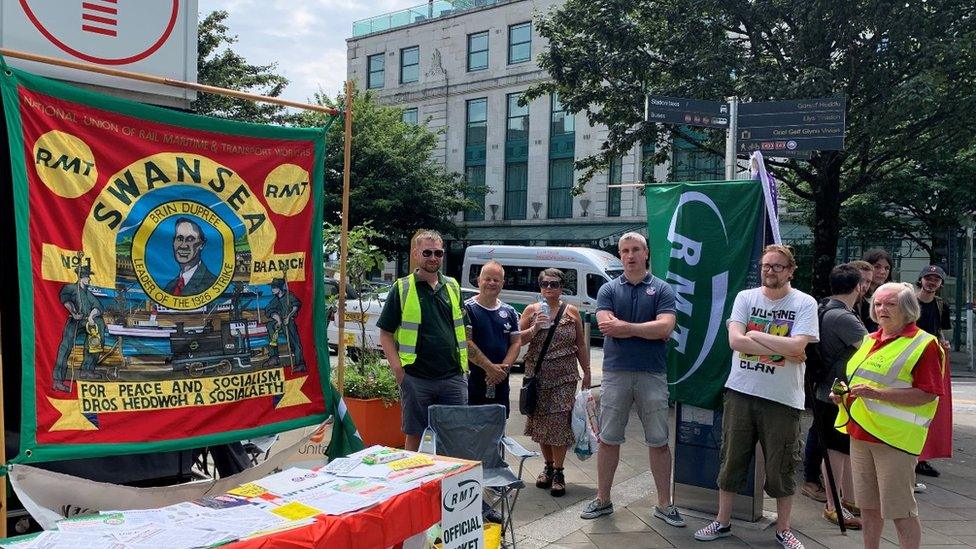
Pickets out in Swansea for the second day this week
Rail users in Wales are undergoing new disruption after talks to prevent another round of strikes broke down.
Only 10% of services are expected to run on Thursday, the second of three days of action this week.
Steven Skelly of the RMT in Wales said talks ended because of the government's refusal to give workers assurances, but Prime Minister Boris Johnson called strikes wrong and unnecessary.
UK Hospitality said they were having a "devastating" impact in Wales.
The dispute about pay and working conditions, which also affects England and Scotland, remains unresolved.
Mr Skelly told BBC Radio Wales Breakfast: "We don't want to be taking industrial action.
"We want to sit down and to reach a sensible agreement on the three key element of dispute: to get a pay rise, to a have a no compulsory redundancies guarantee and to also have no changes in terms and conditions without prior agreement from the union."
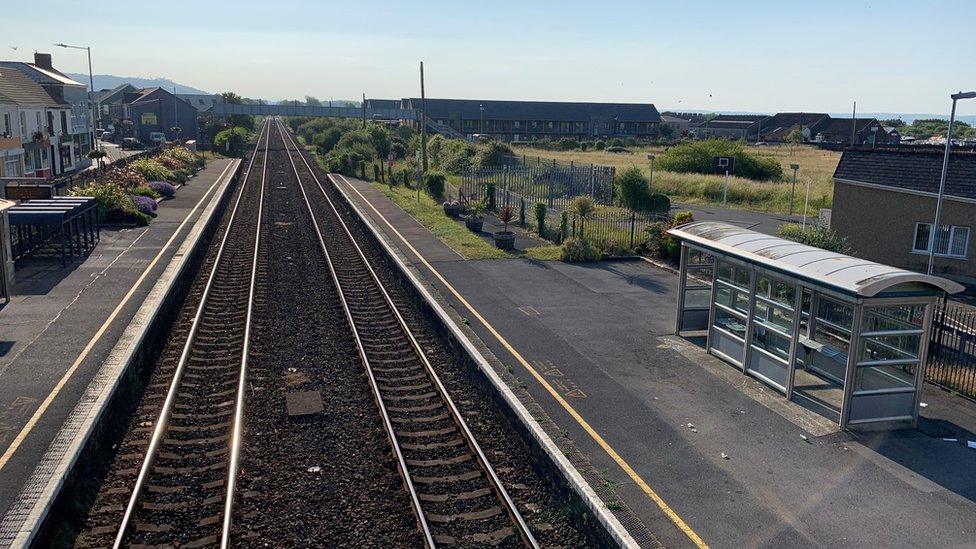
Burry Port station was very quiet again on Thursday
The RMT is calling for a pay rise of at least 7% amid the rising cost of living, as inflation hits 9.1% and is forecast to reach 11% in the autumn.
Employers have offered a maximum of 3%, on condition that the union accepts new working practices.
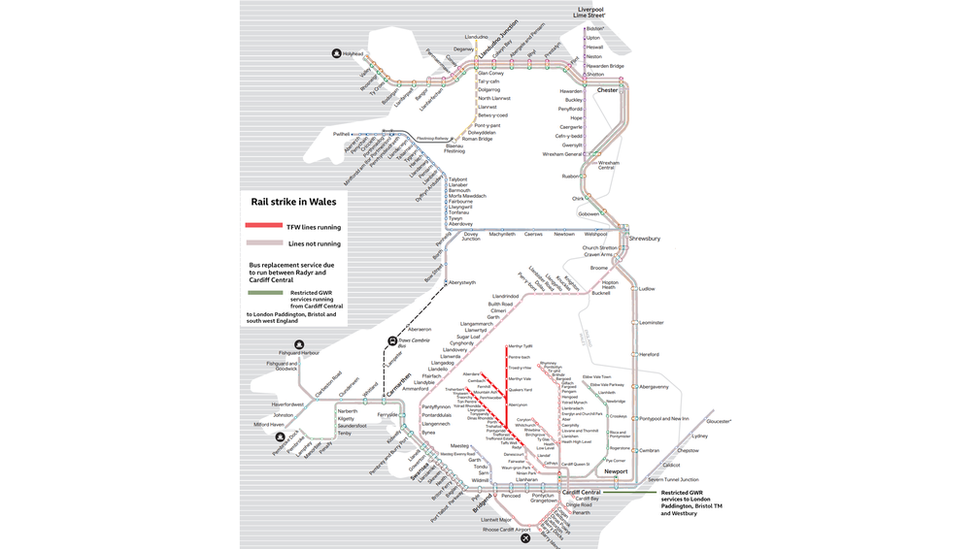
Mr Skelly said it was "unfortunate" that the UK government wanted to "hammer through various changes". The union remained available for talks to resolve the dispute, he said.
Nick Millington from Network Rail said if further strikes were to take place, they would look at an "improved service" on strike days. "As time goes on we are considering how we can offer more services to customers," he said.
Kate Nicholls, chief executive of UK Hospitality, said the strikes were having a "devastating" impact on the hospitality and tourism services and businesses across Wales.
'Really damaging'
"For a large part of Wales - mid and north - there's no services running at all. The message there is very clearly that Wales is shut for business and that's really damaging when we are going in to our busy trading season where customers would be normally getting around by rail," she told BBC Radio Wales Breakfast.
"We are seeing widespread cancellations and loss of business and then you have towns and city centres where people are not coming in at all - as little as 10% of a normal trading day," she added.
The sector as a whole was losing about half a billion pounds this week, according to Ms Nicholls, pointing out the importance of the tourism sector for the Welsh economy.
"You then have the knock-on effect on consumer confidence and the threat of a wave of strikes over the summer."
Nick Garnell, the managing director of Gourmet Coffee Bar and Kitchen, said Tuesday's rail strike had been "terrible" for his business.
The firm had no option to open at seven of the stations it operates out of because the stations themselves were closed. The company operates 20 locations across Wales and England, including in Cardiff and Wrexham.
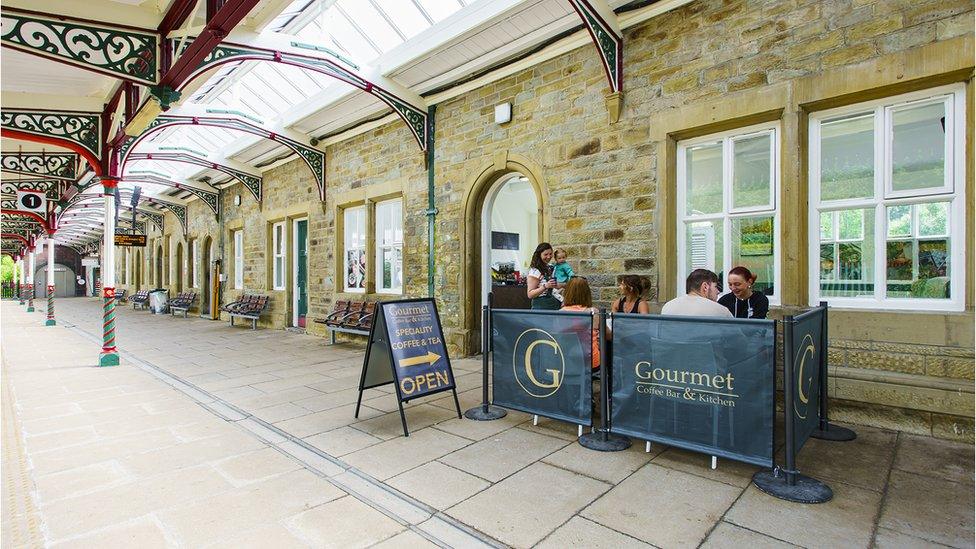
Gourmet Coffee, whose premises include Wrexham railway station, was badly hit by the first strike
"We opened everywhere just to see what was happening. In many cases we closed fairly rapidly because it was desperately quiet," said Mr Garnell.
"We did remain open at Cardiff there was just enough business to justify keeping open.
'Very bad result for everyone'
"At the end of the day we did 8% in terms of sales that we did last Tuesday."
He said it was "fine" for workers to try and settle the dispute but added that bringing the rail network to a halt was "just a very bad result for everyone".
"It's terrible for us and lots of other businesses that are in or next to stations," he said.
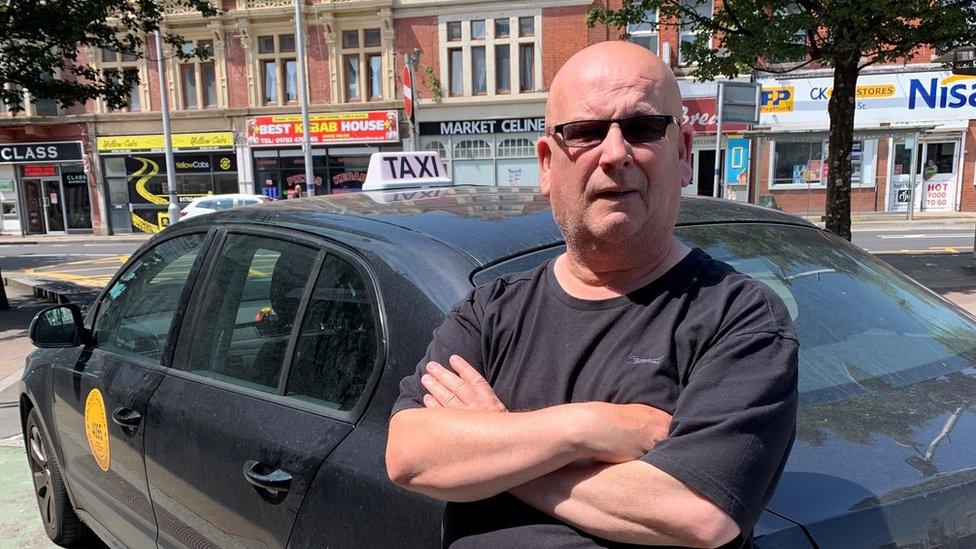
Tim Cullen said he would hate to see more strikes
Swansea cabbie Tim Cullen, 58, said he had been out since 05:30 BST and had just three fares worth £12, as opposed to the usual 10-12 by mid-morning.
He said: "They have their point, but there are other points as well. They've brought the country to a halt."
He said there had been five taxis at Swansea railway station all morning, instead of the typical 25.
Mr Cullen said he would "hate to see" further strikes, adding: "We pay a lot of money to come on here for each individual car and it's a loss of three days' work for us this week."
Fellow driver Phillip Cole, 60, had talen only two fares since 07:30 instead of the usual 12-14 a day.

Phillip Cole had some sympathy with the railway workers
He said: "Tuesday was the same. Saturday's going to be the same. We're losing a bit over the week. My wages will be down.
"It's not the best anyway the way things are going with the fuel. I'm putting more in than I have done for a long time."
But he said he had some sympathy with the railway workers.
"Everybody needs their wages to go up now to survive," he said.
"That's the only thing they can do really isn't it?"
Mr Johnson told Prime Minister's Questions on Wednesday that the government was doing "everything we can to prevent these strikes" and it was up to the railway companies to negotiate.
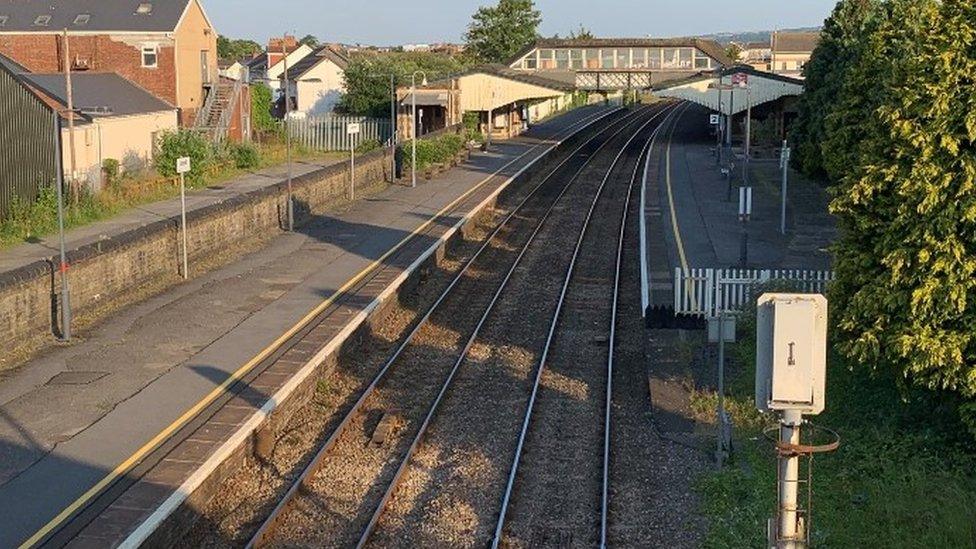
No movement at Llanelli on the second day of the week's strike action
Just five Welsh services are running on Thursday and they will operate a limited service.
There a no trains west of Cardiff or north of Merthyr Tydfil. Trains will start later and finish earlier from 07:30 BST to 18:30 across most of the rail network.
The UK government has published plans which would allow businesses to bring in agency workers during strikes.
The proposals would need to be approved in parliament but ministers say they would limit the impact of future walkouts. Unions say the plans would undermine workers' rights and put public safety at risk.

FIGHT FOR YOUR RIGHTS: X-Ray has got your back
SPOTLIGHT ON THE NHS: Is Covid masking a bigger problem with our health service?

- Published22 June 2022
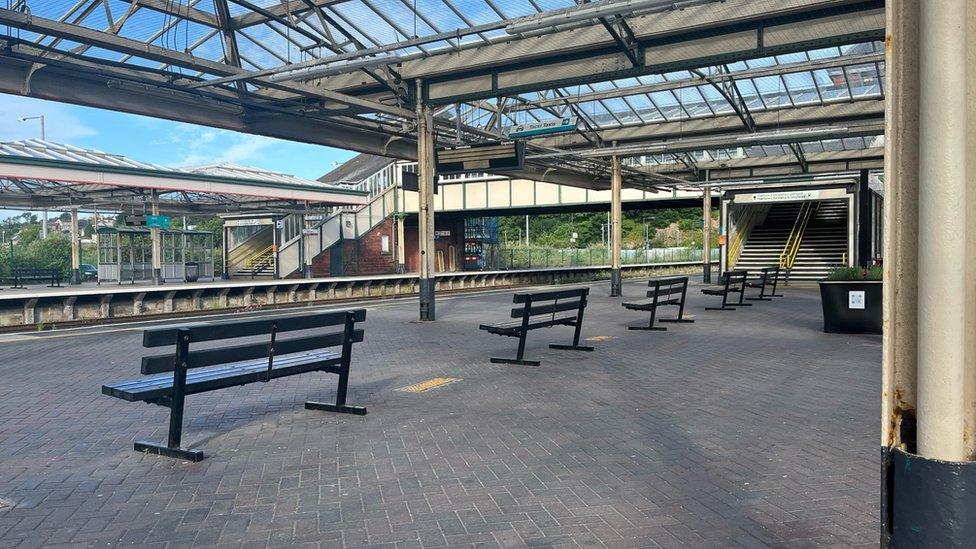
- Published23 June 2022
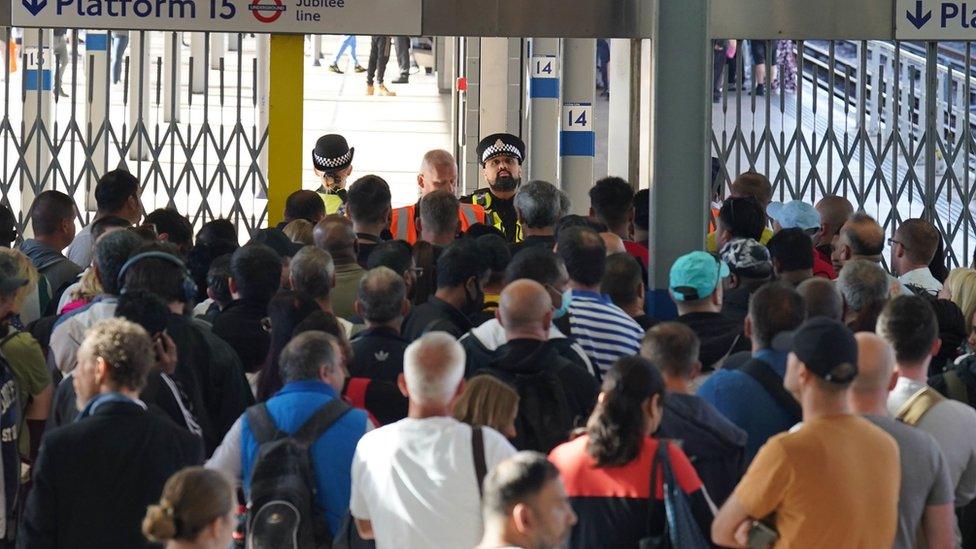
- Published23 June 2022
